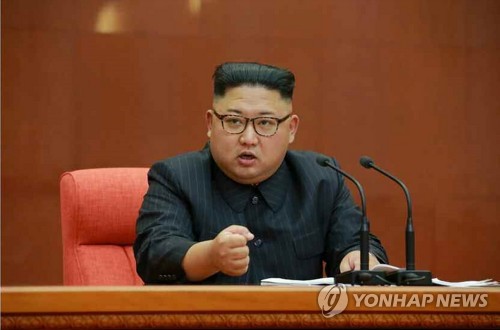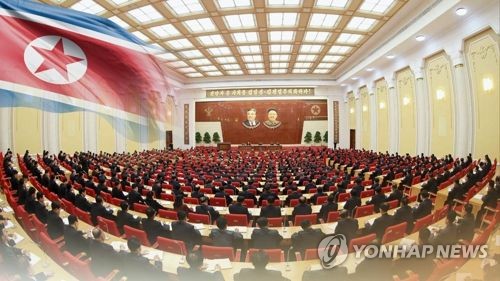North Korea said Saturday that it has decided to suspend nuclear and missile tests and shut down its atomic test site, in a surprise announcement that could give momentum to its upcoming summits with South Korea and the United States.
The announcement came amid a diplomatic push to denuclearize North Korea, the main agenda for North Korean leader Kim Jong-un's planned meeting with his counterparts from the South and the U.S.
"From April 21, North Korea will stop nuclear tests and launches of intercontinental ballistic missiles," the Korean Central News Agency (KCNA) said, citing the outcome of a key meeting of the ruling party held Friday.
"The North will dismantle a nuclear test site in the country's northern area to guarantee transparency in suspending nuclear tests," it added.

North Korea has conducted all of its six nuclear tests at the Punggye-ri test site in the northeastern province since 2006. The North's latest and most powerful nuclear test was conducted in September last year.
The decision was made at the plenary meeting of the central committee of the ruling Workers' Party of Korea (WPK), which drew keen attention over whether the North would possibly unveil a shift in stance toward its nuclear programs.
Trump welcomed North Korea's decision to suspend nuclear tests and close the nuclear test site.
"This is very good news for North Korea and the World - big progress! Look forward to our Summit," Trump tweeted.
At the meeting, the North hinted at a new policy line to bolster its fragile economy, in an apparent shift in the focus in Kim's signature "byongjin" policy of seeking both nuclear and economic development, which was adopted at the WPK's meeting held in March 2013.
Kim said that it will focus on boosting its economy, which has been crippled by tougher international sanctions over its nuclear and missile provocations.
"At the current stage where our nation has risen to the status of a political and military powerhouse, focusing on building the economy based on socialism is the WPK's strategic party line," Kim stressed.
Kim will sit down with President Moon Jae-in next Friday, followed by a summit with U.S. President Donald Trump probably in May or early June. North Korea's denuclearization will top the agenda for those meetings.
A mood for rapprochement was created on the Korean Peninsula after in his New Year's message Kim announced a plan to send athletes and others to the PyeongChang Winter Olympics in February in the South.
The move came after more than a year of heightened tensions sparked by Pyongyang's nuclear and missile aspirations. Kim and Trump exchanged bellicose rhetoric and personal insults, raising fear of Washington's possible military operation on the North.
The North said as it has completed development of nuclear weapons and that it does not need to conduct any more nuclear and missile tests.

The KCNA said the suspension of its nuclear tests is critical in the path toward global nuclear disarmament, adding that Pyongyang will join such efforts.
"The North will not use its nuclear weapons as long as there are no nuclear threats or provocation against it. It also vows not to transfer nuclear weapons and technology to others in any case," it said.
After visiting North Korea last month, South Korean envoys told Trump that Kim expressed a willingness to denuclearize.
The North reportedly suggested a need for phased and synchronous measures for denuclearization, but the U.S. has called for the dismantlement of its nuclear program in a complete, verifiable and irreversible manner.
President Moon said Thursday that North Korea has voiced a willingness for "complete denuclearization" and does not attach conditions that the U.S. cannot accept, such as the withdrawal of U.S. forces stationed in South Korea.
Meanwhile, North Korea decided on a personnel reshuffle at the party meeting.
Kim Jong-gak, the new director of the general political bureau of North Korea's armed forces, was named as a member of the WPK's political bureau.
Ri Son-gwon, the chief of the state agency handling inter-Korean affairs, became an alternate member of the WPK's central committee. He attended the latest high-level inter-Korean talks as the chief delegate. (Yonhap)

